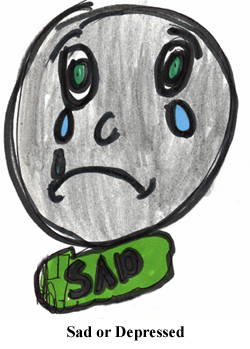
For several weeks, I’ve been writing on different aspects of Understanding Emotions in children who are grieving a loss in their life. Emotions are the bulk of the grieving process and the more we, as caring adults, get involved in trying to understand their emotions, the better equipped we are to help a child work through the maze.
Today, the main topic of concern is Depression. Let me say right away that, “Experientially, I know nothing about depression in children or adults, for that matter.” And for that, I am eternally grateful, because I know that it can be a serious problem. Further down in this post, I will give you a check list for signs of depression in children from The National Health Association.
But first, I want to point out a couple of things to take into consideration before jumping to the conclusion that a child has depression.
1. It is natural for children to have feelings of sadness at any time.
Let’s face it – none of us run on a “high” every day of our lives. Just turning on the news, can make us sad at what is happening around the world. Kids are no different. In their own little world, they can have bouts of sadness from such things as: having their feelings hurt at school, watching a sad movie, or losing a ballgame.
As the primary adult in their lives, we can help them overcome these bouts of sadness by teaching them to think positive, help them find a solution to their problem, and get them involved in an activity to take their mind off their sadness. An activity that I would highly recommend is exercise, which I believe children don’t get enough of these days due to the current technology craze.
2. It is natural for children to have feelings of sadness after a loss to the point that their normal behavior changes.
Unfortunately what could be a temporary change in behavior is sometimes labeled incorrectly by adults. Read what Linda Goldberg, Professional grief therapist and counselor had to say about this.
“The adult world often judges and labels children negatively for their behaviors. Many of our children are often labeled ADD or ADHD, slow learners or troublemakers — and when they spiral down far enough, they are then criminalized, hospitalized, or buried.”
Linda goes on to say that this is happening because “the adult world does not recognize the signs of grief in a child.If we did, then we could help them before their pleas turn into screams and before the screams are forever silenced.”
The question is:
How can we recognize the difference between Sadness and Depression?
If sadness is prolonged, it could, indeed, mean a sign of depression, which should be treated by a professional. The National Mental Health Association gives a checklist to assess depression signs.
Checklist For Signs of Depression
|
Feeling |
Physical Problems |
|
guilt |
headaches |
|
emptiness |
stomachaches |
|
hopelessness |
lack of energy |
|
worthlessness |
has problems sleeping |
|
does not enjoy everyday pleasures |
changes in weight or appetite |
|
Thinking Problems |
Behavioral Problems |
|
has hard time concentrating |
not wanting to go to school |
|
hard time keeping up his grades |
desires to be alone most of the time |
|
slow in completing school work |
drops out of sports/hobbies, activities |
|
has hard time making decisions |
restless |
Oh my dear friend, guidance, guidance, guidance is what we should seek from the Lord when dealing with any situation involving our children. But, I have to say that it scares me when I think of what Linda Goldman said about children being labeled ADD or ADHD, slow learners or troublemakers when, in fact, they are just acting out their grief.
So, I leave you with one of my favorite scriptures concerning guidance and wisdom:
But, if any of you lack wisdom, let him ask of God, who gives to all men generously and without reproach, and it will be given to him. (James 1:5)
Thanks for reading, and join Hannah and me right here next week.









